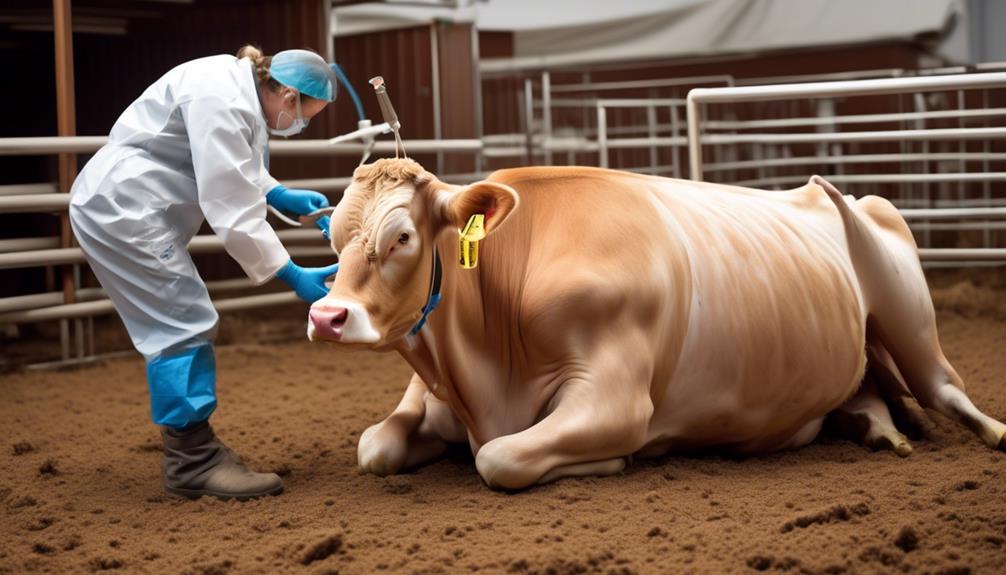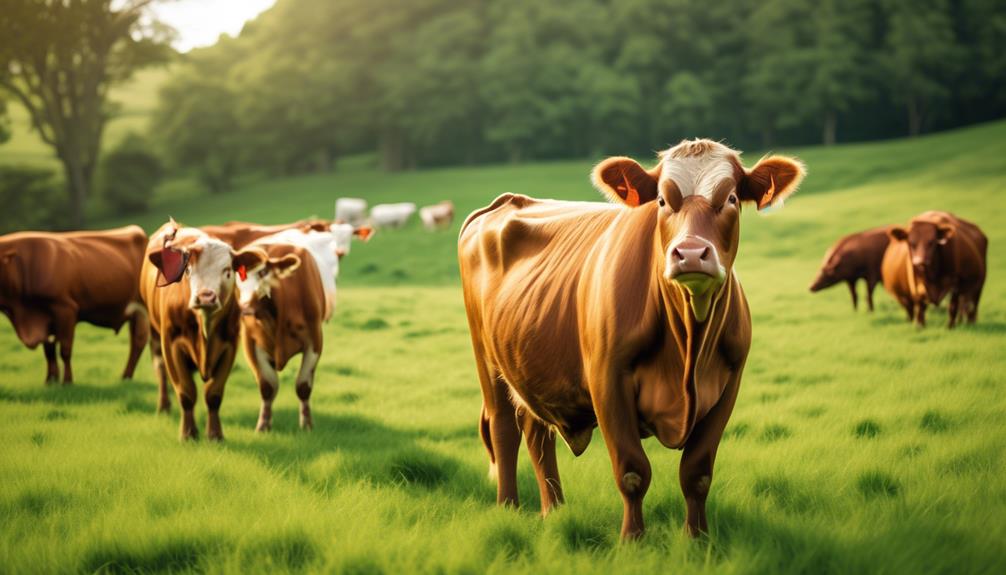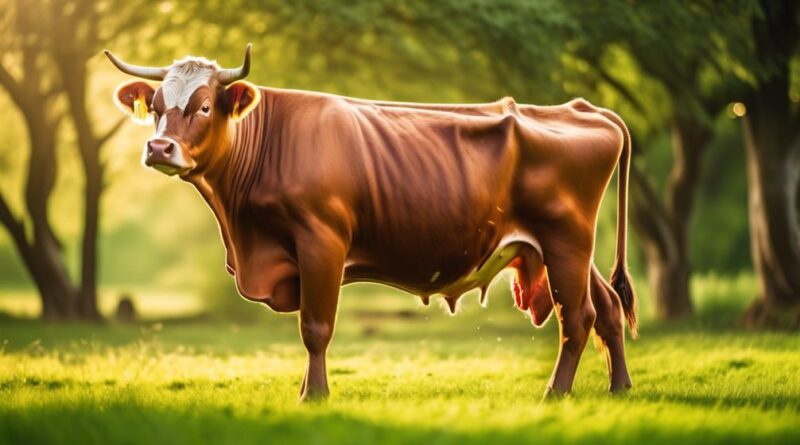Optimizing Hormones for Beef Cattle Growth
You're standing at the edge of a vast field, watching as your cattle graze and grow under the sun. But what if there was a way to optimize their growth, to ensure that they reach their full potential?
That's where hormone optimization comes into play. By carefully managing and regulating the hormones in your beef cattle, you can unlock a new level of growth and productivity.
But how exactly does hormone optimization work, and what are the best practices for implementing it in your operation? Let's explore the intricacies of hormone regulation and its impact on beef cattle growth, and how it can benefit your bottom line.
Importance of Hormone Optimization
To optimize beef cattle growth, it's crucial to carefully manage hormone levels, ensuring a balanced and healthy development. Hormone efficiency plays a vital role in the growth potential and sustainability of beef cattle. When hormone production is optimized, it directly impacts the overall growth and development of the cattle, contributing to the sustainability and efficiency of beef production.
Efficient hormone production is essential for maximizing the growth potential of beef cattle. Hormones such as growth hormone and insulin-like growth factor-1 play a significant role in regulating the growth processes within the cattle's body. By ensuring that these hormones are produced efficiently, you can enhance the growth potential of the cattle, leading to healthier and more robust animals. This not only benefits the individual animals but also contributes to the overall sustainability of beef production.
Furthermore, optimizing hormone levels is crucial for the sustainability of beef cattle growth. When hormone production is managed effectively, cattle are able to reach their full growth potential in a healthy and balanced manner. This sustainable approach to growth ensures that the cattle aren't only growing efficiently but also maintaining good health throughout the process. By prioritizing hormone optimization, you aren't only promoting the growth of individual animals but also contributing to the long-term sustainability of beef production.
Types of Growth Hormones
Optimizing hormone levels in beef cattle growth involves understanding the various types of growth hormones that play a crucial role in regulating the animals' development.
When it comes to growth hormone effectiveness, it's important to consider the different types of growth hormones used in beef cattle production. One of the most common growth hormones is recombinant bovine somatotropin (rBST), which is a synthetic version of the naturally occurring bovine somatotropin hormone. rBST is known for its effectiveness in promoting growth and increasing milk production in dairy cattle. However, its use in beef cattle is restricted in some regions due to concerns about its potential impact on animal health and food safety.
Another type of growth hormone is natural bovine somatotropin (BST), which is naturally produced by the pituitary gland in cattle. Although BST has been studied for its potential to improve growth and feed efficiency in beef cattle, its use is limited due to hormone dosage restrictions and concerns about its impact on animal welfare.
When considering growth hormone effectiveness and hormone dosage restrictions, it's essential to work closely with veterinary professionals and follow regulatory guidelines to ensure the responsible and ethical use of hormones in beef cattle production.
Hormone Regulation in Cattle
Understanding the regulation of hormones in cattle is essential for optimizing their growth and development. Hormone signaling plays a crucial role in the growth performance of beef cattle. Hormones are regulated through a complex network of feedback mechanisms involving the endocrine system. The endocrine system consists of various glands such as the pituitary gland, hypothalamus, and adrenal glands, which work together to produce and regulate hormones. These hormones, such as growth hormone and insulin-like growth factor, play a vital role in controlling growth and metabolism in cattle.
Hormone regulation in cattle is a finely tuned process that involves the interaction of various hormones and their receptors. When the animal's body requires a particular hormone, the signaling pathway is activated, leading to the release of the hormone from the respective gland. Once released, hormones travel through the bloodstream to their target tissues, where they exert their effects by binding to specific receptors. This binding triggers a cascade of events within the cell, ultimately influencing growth and development.
Moreover, the regulation of hormones in cattle is also influenced by external factors such as nutrition, stress, and environmental conditions. For instance, under conditions of stress, the release of certain hormones may be altered, impacting the animal's growth performance. Therefore, understanding the intricate regulation of hormones in cattle is essential for implementing strategies to optimize growth and ensure the overall well-being of the animals.
Hormone Imbalance Effects
Hormone imbalance in beef cattle can significantly impact their growth and overall health. When hormones aren't properly regulated, it can lead to various adverse effects on the development of the animal. Imbalances in hormones such as growth hormone, insulin-like growth factor, and thyroid hormones can hinder the normal growth processes in cattle.
Growth hormone imbalance can lead to stunted growth and reduced muscle development, affecting the overall body size and weight gain of the cattle. Additionally, an imbalance in insulin-like growth factor can disrupt the normal functioning of cells, impacting the development of tissues and organs essential for growth. Thyroid hormone imbalance can also negatively impact growth by affecting the metabolism and energy utilization in the body.
Furthermore, hormone imbalance can have long-term effects on the overall development of beef cattle. It can lead to delayed sexual maturity, affecting the reproductive capabilities of the animal. This can have significant implications for the breeding and production capabilities of the herd. Additionally, hormone imbalance can weaken the immune system, making cattle more susceptible to diseases and infections, further hindering their growth and overall health.
Hormone Administration Methods

Consider utilizing implants, oral administration, or topical methods for efficient hormone delivery in beef cattle.
When it comes to implant effectiveness, subcutaneous implants are commonly used in beef cattle for hormone administration. These implants slowly release hormones into the animal's system over a period of time, providing a consistent and prolonged effect. However, it's essential to follow proper injection techniques to ensure the implants are correctly placed and functioning optimally.
Hormone absorption through oral administration is another method to consider. Incorporating hormones into feed or mineral supplements allows for convenient delivery to the cattle. However, it's important to note that hormone absorption through the digestive system can be variable, and factors such as feed composition and animal health can impact absorption rates. Thus, it's crucial to carefully monitor hormone levels and make any necessary adjustments to ensure desired growth outcomes.
Topical methods involve applying hormone formulations directly onto the skin of the animal. This method may offer ease of application, but absorption rates can vary depending on factors such as skin thickness and hair coat density. Additionally, care must be taken to prevent accidental exposure to humans and other animals.
Monitoring Hormone Levels
Utilize regular testing to monitor hormone levels in your beef cattle, ensuring that the administered hormones are effectively influencing growth and development. By regularly checking hormone levels, you can make informed decisions about adjustments to hormone administration methods and ensure the overall health and well-being of your herd.
Here are some key points to consider when monitoring hormone levels:
- Hormone testing: Regularly conduct hormone testing to assess the levels of growth-promoting hormones in your cattle. This will provide valuable data for analysis and decision-making.
- Data analysis: Utilize the data from hormone testing to analyze the effectiveness of the administered hormones. Look for correlations between hormone levels and growth to make informed adjustments as needed.
- Growth correlation: Monitor hormone levels in relation to the growth and development of your beef cattle. By establishing correlations between hormone levels and growth, you can optimize hormone administration for maximum impact.
- Health assessment: Monitoring hormone levels also allows you to assess the overall health of your cattle. Deviations from normal hormone levels could indicate underlying health issues that need to be addressed.
- Regulatory compliance: Regular hormone level monitoring ensures compliance with regulations and guidelines regarding hormone use in beef cattle. This helps in maintaining the quality and safety of beef products for consumers.
Hormone-Free Alternatives

When exploring hormone-free alternatives for your beef cattle, it's essential to consider methods that prioritize natural growth and development without relying on artificial hormone administration. Embracing natural alternatives is a cornerstone of ethical farming practices, ensuring the well-being of your animals and the production of high-quality beef.
One effective hormone-free alternative is providing a well-balanced diet that meets the nutritional needs of your cattle. This includes access to high-quality forage, pasture, and/or a nutritionally balanced feed ration. By focusing on the natural dietary requirements of your cattle, you can support their growth and development without the use of synthetic hormones. Additionally, promoting a stress-free environment and ensuring ample space for exercise can contribute to healthy, natural growth.
Implementing selective breeding programs is another natural alternative to hormone administration. Through selective breeding, you can choose cattle with desirable genetic traits that promote efficient growth and development. This approach aligns with ethical farming practices, as it emphasizes natural selection and genetic diversity without relying on artificial enhancements.
Furthermore, optimizing herd management practices, such as proper vaccination protocols and disease prevention strategies, can support the natural growth of your beef cattle. Minimizing stress, providing access to clean water, and maintaining comfortable living conditions are essential components of ethical farming practices that contribute to hormone-free growth alternatives for your cattle.
Regulatory Considerations
To ensure compliance with regulatory standards, be sure to consult with your local agricultural authorities regarding the use of hormones in beef cattle growth. Regulatory compliance is essential when it comes to optimizing hormones for beef cattle growth. Here are some key considerations to keep in mind:
- Local Regulations: Each region may have specific regulations concerning the use of hormones in beef cattle. It's crucial to be aware of and adhere to these local regulations to ensure compliance.
- Approved Hormones: Familiarize yourself with the approved hormones for use in beef cattle growth. Using unapproved hormones can lead to regulatory issues and may not align with industry standards.
- Dosage and Administration: Understanding the correct dosage and administration of hormones is vital for regulatory compliance. Ensure that you follow approved guidelines for the administration of hormones to avoid regulatory issues.
- Record Keeping: Maintaining detailed records of hormone usage is essential for regulatory compliance. Accurate record-keeping can help demonstrate adherence to industry standards and regulatory requirements.
- Audits and Inspections: Be prepared for audits and inspections by regulatory authorities. Having thorough records and being able to demonstrate compliance with industry standards is crucial during these processes.
Frequently Asked Questions
Can Beef Cattle Naturally Regulate Their Hormone Levels Without the Need for Optimization?
You might wonder if beef cattle can naturally regulate their hormone levels without optimization. It's essential to understand the balance between natural regulation and growth optimization to minimize long-term health risks.
Are There Any Potential Long-Term Health Risks Associated With Using Growth Hormones in Beef Cattle?
Using growth hormones in beef cattle can pose potential long-term health risks. These include concerns about the impact on human health and the environment. It's important to carefully consider the implications of these practices.
How Do Hormone Levels in Beef Cattle Affect the Taste and Quality of the Meat?
When hormone levels in beef cattle are managed properly, the taste preference and consumer perception of the meat can improve. Balanced hormone levels can lead to better marbling, tenderness, and overall quality, enhancing the eating experience.
What Are the Ethical Considerations of Using Growth Hormones in Beef Cattle?
When considering the ethical considerations of using growth hormones in beef cattle, it's important to prioritize animal welfare. Regulatory oversight ensures safe usage, but consumer perception and long-term effects also require attention.
Are There Any Alternatives to Using Growth Hormones in Beef Cattle That Can Still Promote Optimal Growth?
To promote optimal growth in beef cattle without using growth hormones, consider natural alternatives like feed supplements, genetic breeding, and dietary adjustments. These methods can effectively support cattle growth while avoiding hormone usage.
Conclusion
In conclusion, optimizing hormones for beef cattle growth is crucial for maximizing production and efficiency.
Understanding the types of growth hormones and their regulation in cattle is essential for achieving balanced hormone levels and minimizing negative effects.
Monitoring hormone levels and considering hormone-free alternatives are important for sustainable and ethical practices.
Ultimately, regulatory considerations play a key role in ensuring safe and responsible hormone administration in beef cattle production.
